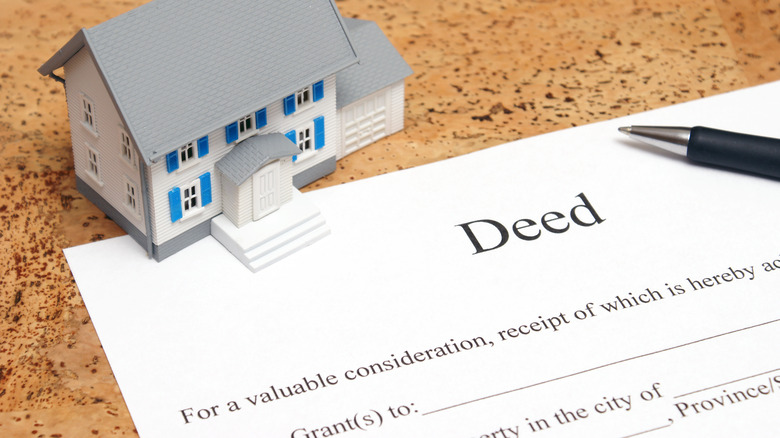What You Need To Know About Clear Titles In Real Estate
As homebuying demand increases, it's important for you as a homeowner to be well-informed about property ownership; specifically, property titles. Investopedia explains that a clear title or a "just title," also called a clean title, is a property title free of liens, debts, claims, or encumbrances from parties that could put the ownership of a home into doubt.
If a home doesn't have a clear title, you won't be able to purchase it. Why? Because no lender would sign off on a mortgage for a property in which there's a question in regards to its ownership. Does the seller actually own the home or not? Without a clean or just title, this is an unknown, and a lender won't agree to a home loan with such uncertainty attached.
To aggravate this, you also risk losing the house altogether if you had bought it and the clear title ends up being deficient. Titles must undergo reviews and title searches for any kind of claims or liens before a title company considers them clean or "just." Otherwise, closing won't occur.
How to check for a clean title
If you want to buy or sell a home, you first need to conduct an online title search or check with the nearest property records database. According to Bankrate, this will help you know the title's official record, as well as what is missing and what might need checking. Per First American Financial, possible issues include a forged deed or a deed signed by mistake, zoning violations, an undisclosed divorce, or a discovery of will.
As a buyer, you might discover issues like unpaid dues on the owner's side or that the seller doesn't consistently pay his taxes. Running a title search will also help you know if there's any form of disputes concerning property lines. Rather than risk losing your newly bought house, it's better to conduct a title search for any defects and be in the loop.
In some cases, title searches will help you to secure title insurance if they uncover matters of legal costs. There is lender's title insurance, which protects the lender of any potential loss, and owner's title insurance, which protects you, the homebuyer. Further, the costs of title insurance vary from state to state. As Bankrate notes, in some states, the rates are regulated, and in others, policies are competitive, meaning you can comparison-shop.
How clear titles work
Suppose you found a great home and would like to purchase it; a dirty title could put a halt to those homebuying plans, as questions about ownership and other issues, as noted above, would first need to be addressed and resolved. A clear title, on the other hand, assures you the property owner possesses the rightful legal documents to make the sale. Per Investopedia, however, as the new owner, you will be responsible for anything that's still outstanding on the property, such as payment for contract work. It's only after the title company deems it a clean title that you will get a title deed in your name.
Remember that the process of buying a home is not easy. It involves several steps, from applying for a mortgage to hiring a real estate agent, negotiating, and scheduling an appraisal and/or inspections. Therefore, you don't want anything else coming your way later on — especially something you could have avoided with a bit of research. Worse, the bank offering the mortgage will also search for any liens. If they discover any, you will need to clear them before you receive the loan. Working with a real estate company or an escrow group aids a great deal since they know what to look for when conducting title searches.
How to get a clear title
How can you be sure the house has a clean title? According to Max Real Estate Exposure, you can solve financial issues on a property before closing. For example, using part of the seller's proceeds to pay off any outstanding debt to a contractor.
Secondly, you could hire title specialists to help solve the matter; once they've resolved the title's problems, a clear title can be issued. You can also apply a quiet title action to solve ownership rights conflicts. However, some kinds of liens are simply difficult to solve. For example, the California Land Title Association reports that cases involving forged legal documents have increasingly become a problem for property owners. Also, disputes over property encroachments may go on for ages before they're settled, leaving a clear title in limbo.
A title insurance company will first run a preliminary title report on any property it's been hired to insure. The title company will trace back the ownership rights of the home for clarification. You can always buy the title report to help you review and identify the liens and debts. As noted above, you can then purchase owner's title insurance to protect you from the blemishes.
Why titles can be considered unclear
Did you know that you could still face title issues with a house you have lived in for years when you put it on the market? According to HomeGo, title issues account for 11% of all closing problems when selling or buying a home.
Investopedia states that just because someone lives in a house doesn't mean its title is clear. In such cases, it is likely because ownership is in dispute, as the property may never have been vested to the person trying to sell the home. Any discovered liens or issues concerning ownership will likely be more of a surprise to the seller than anyone else.
As mentioned before, a title can come back as unclean after a search due to several reasons. For example, unresolved divorce issues of homeowners who mutually owned a house would mean both parties still have ownership of the home. The problem arises when either of them tries to sell the house after separation. Also, fraudulent documents, such as a forged deed, can prove difficult to resolve, but they must be before a lender will sign off on a mortgage, without which a sale is likely impossible.
In other cases, beneficiaries of the property may have allegations over the home, per First American Financial. Say, the owner listed them as the rightful descendants, yet they never filed with the records office. Alternatively, they gave rights to an heir without including the other parties. When one of the beneficiaries tries to put the house on sale, they will face confrontations from the other party.




